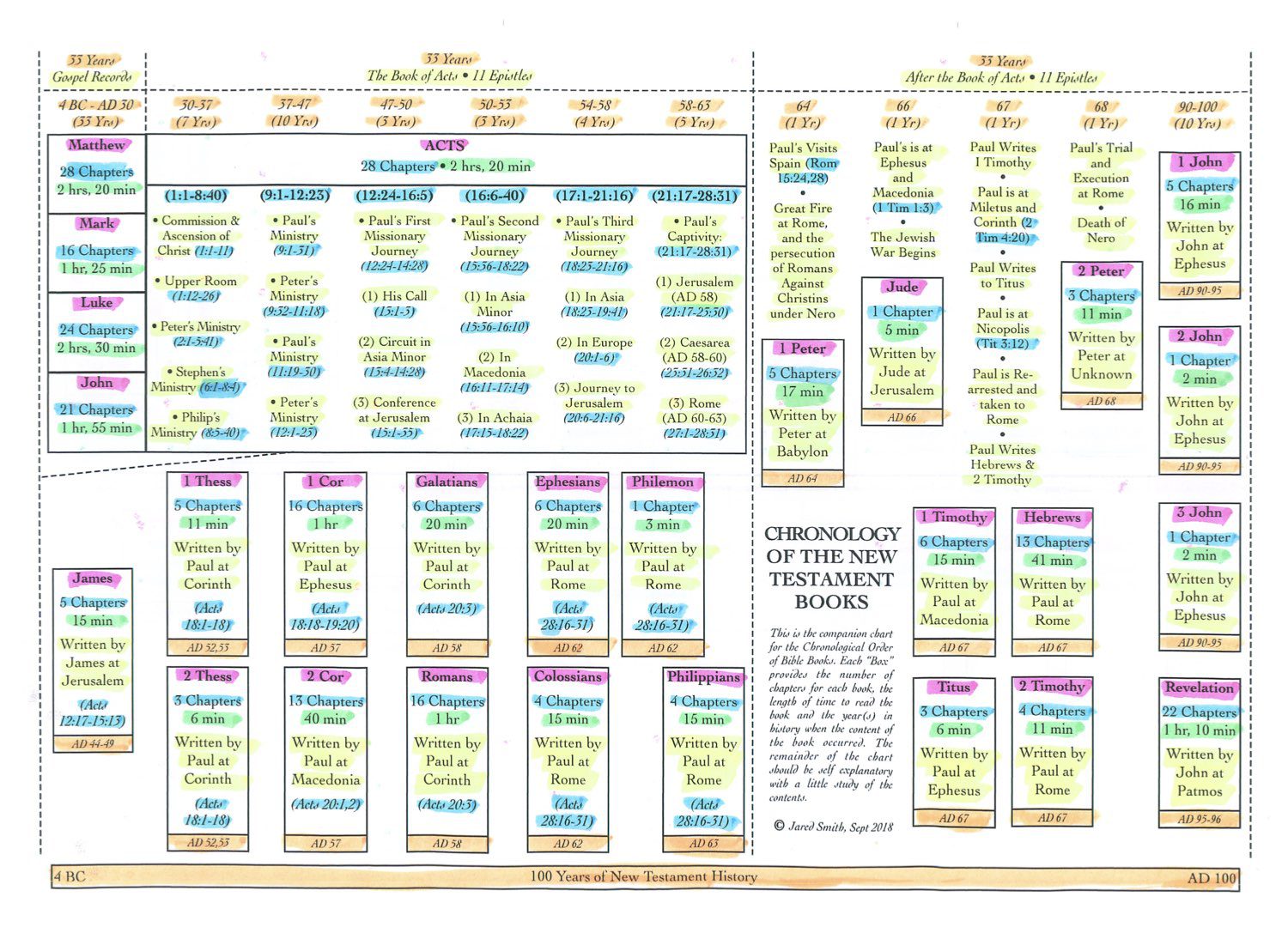
The Third Epistle Of John
The Background
The third letter of John was written between the years 90 and 95AD to a group of churches. The chart below provides a bird’s-eye view of the chronological order for the books of the New Testament.

John Gill, “Commentary On The New Testament Scriptures”:
“This epistle was written by the Apostle John, who calls himself an “elder”, as in the preceding, and is inscribed to a friend of his, whom he mentions by name, and expresses a very great affection for, on account of his steady adherence to the truths of the Gospel, (3 John 1:1); he wishes him bodily health equal to that prosperity of soul he was indulged with, (3 John 1:2); congratulates him upon the testimony the brethren that came from him gave him of the truth being in him, and of his walking in it, and upon hearing that his children also trod in the same path, (3 John 1:3,4); commends him for his hospitality and charity, of which testimonies were given before the church; and encourages him to go on doing the same acts of beneficence, since it was to such persons that went forth for the sake of Christ, and preaching in his name, and had nothing of the Gentiles for so doing; wherefore they ought to be received, and entertained by those of ability, that they might be fellow helpers to the truth with them, (3 John 1:5-8). He complains of Diotrephes as a proud, haughty, and overbearing man in the church, where Gaius was a member, who would neither receive the letters the apostle sent, nor the brethren that came with them; nay, forbid them that would, and cast them out of the church for it, and prated against them with malicious words, whom he threatens to remember when he himself should come thither, (3 John 1:9,10); wherefore he exhorts Gaius not to follow such an ill example, but that which is good in any person; since he that does good appears to be of God, and he that does evil, it looks as if he had never known him, (3 John 1:11). And particularly he recommends Demetrius, who had a good report of all men, and of the truth itself, and had a testimony from the apostle, and those that were with him, which was known to be a true one, (3 John 1:12). But though he had many things to say, both of one, and of the other, he determines to write no more at present, hoping he should shortly see him, and personally converse together; and closes the epistle with his own good wish, and with mutual salutations of friends, (3 John 1:13,14).”
Robert Hawker, “Bible Chapter Summaries And Reflections”:
“Here is another short, but precious Epistle of the same writer, under God the Holy Ghost, as the former. And this is also written to a private person, and not publicly to the church. Who this Gaius was, to whom the beloved Apostle sent this Epistle, is not known, though it hath occasioned much conjecture. He calls him well- beloved. No doubt, as a child of God, he was so; and, on this account, John called him so. Paul had a companion of this name, which we read of, Acts 19:29 and Acts 20:4. But, it is hardly possible that this was the same person to whom John writes this Epistle, for there must have been more than thirty years between the date of those times. However, this is not so material. It is enough for us to know, that this Gaius was well-beloved of John; and, consequently, one of the elect of God. And we know also, that God the Holy Ghost directed the Apostle’s heart and pen to write it, and hath caused it to be recorded for the Church’s benefit. These things are enough in recommendation. I beg the reader to enter, with me, upon the perusal of it in prayer. And very sure I am, if we pray over it, we shall profit under it. May the Lord therefore bless it to our use, and to the whole Church of God in Christ. Amen.
Summary—After his usual salutation, the Apostle tells his beloved Gaius of his desires, both for his temporal and spiritual prosperity. He commends him for his kindness to the brethren. He remarks of the opposition made to the Church, by a man called Diotrephes. He commends another man of the name of Demetrius. And concludes his Epistle with greetings from friends.
Reflections—What a beautiful view is here afforded, of the beloved Apostle in his pastoral office, addressing the faithful Gaius, beloved in the Lord. To behold the venerable saint of God, amidst all the infirmities of declining years, thus blessing God, and blessing the servant of God, in his wishes both for spiritual and temporal prosperity. But while we look at John, who justly commands our veneration and our love, let us look infinitely above John, and behold John’s Lord still blessing all his church; and every Gaius of his redeemed family below, with blessings in himself. Precious, precious Jesus! We desire to praise thee for all that is lovely, in the disciple whom Jesus loved; for all that is lovely in John, was, and is derived from thee! Lord! Hasten on thy blessed purposes, and bring on thy glorious day when thou wilt come to be glorified in thy saints, and to be admired in all that believe! To thee, Lord, it belongs, to keep thy Church from falling, and to present it faultless before the presence of thy glory with exceeding joy. In the blessed hope of thy appearing, may all thy Church in thee, and through thee, daily ascribe to Father, Son, and Holy Ghost, Israel’s God in covenant, endless praises. Amen.”
“All scripture is given by inspiration of God [inclusive of John’s third letter], and is profitable for doctrine, for reproof, for correction, for instruction in righteousness: that the man of God may be perfect, throughly furnished unto all good works.”—2 Timothy 3:16,17
Editor, Jared Smith
The Letter
The elder unto the wellbeloved Gaius, whom I love in the truth. Beloved, I wish above all things that thou mayest prosper and be in health, even as thy soul prospereth. For I rejoiced greatly, when the brethren came and testified of the truth that is in thee, even as thou walkest in the truth. I have no greater joy than to hear that my children walk in truth. Beloved, thou doest faithfully whatsoever thou doest to the brethren, and to strangers; Which have borne witness of thy charity before the church: whom if thou bring forward on their journey after a godly sort, thou shalt do well: Because that for his name’s sake they went forth, taking nothing of the Gentiles. We therefore ought to receive such, that we might be fellowhelpers to the truth. I wrote unto the church: but Diotrephes, who loveth to have the preeminence among them, receiveth us not. Wherefore, if I come, I will remember his deeds which he doeth, prating against us with malicious words: and not content therewith, neither doth he himself receive the brethren, and forbiddeth them that would, and casteth them out of the church. Beloved, follow not that which is evil, but that which is good. He that doeth good is of God: but he that doeth evil hath not seen God. Demetrius hath good report of all men, and of the truth itself: yea, and we also bear record; and ye know that our record is true. I had many things to write, but I will not with ink and pen write unto thee: But I trust I shall shortly see thee, and we shall speak face to face. Peace be to thee. Our friends salute thee. Greet the friends by name.
Paul The Apostle (?-68AD) was a sovereign grace Baptist preacher. He was appointed by Christ to serve as an Apostle, sent out to the wider regions of the world ministering the gospel primarily to the Gentiles. He is the author of fourteen New Testament letters—1 Thessalonians, 2 Thessalonians, 1 Corinthians, 2 Corinthians, Galatians, Romans, Ephesians, Colossians, Philemon, Philippians, 1 Timothy, Titus, Hebrews and 2 Timothy.





